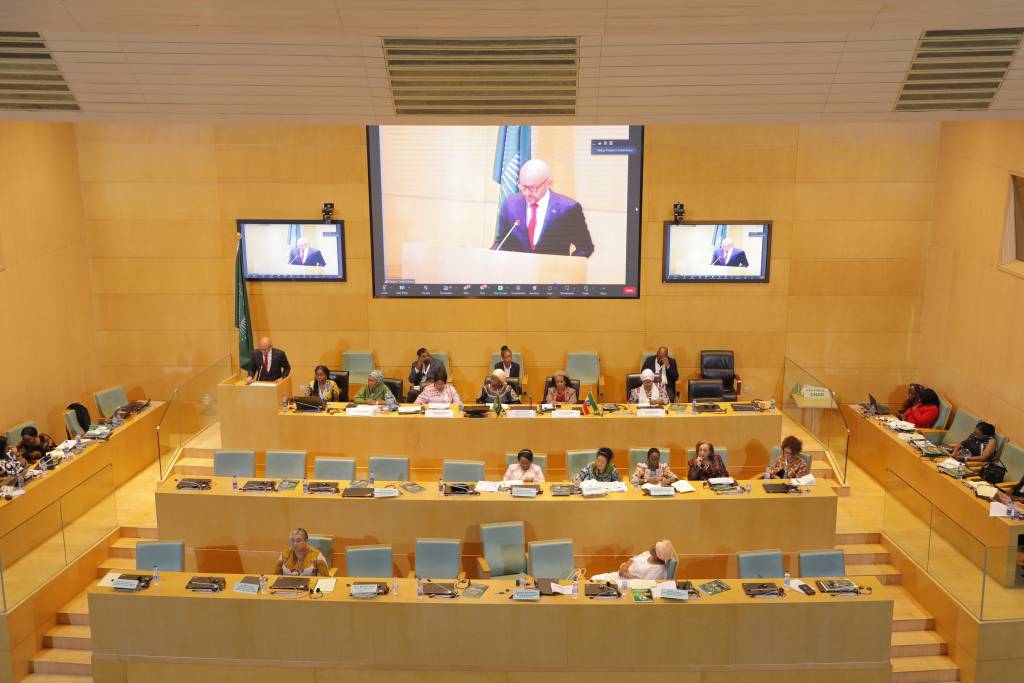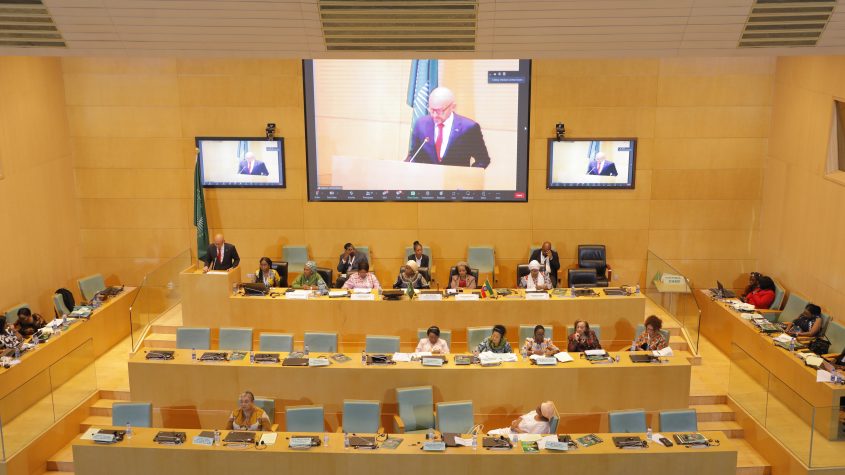4th Africa WPS Forum Push for Enhanced Women’s Role in Africa’s Peace, Security
The 4th High-Level Africa Forum on Women, Peace, and Security sought full integration of women in every aspect of peace processes in Africa towards the attainment of the vision of Africa’s Agenda 2063.

Despite a litany of global and regional normative instruments promoting women’s leadership and participation in peace and security processes, such as the United Nations Security Council Resolution 1325 (UNSC1325), the Windhoek Declaration; Maputo Protocol on Women’s Rights: as well as the Solemn Declaration on Gender Equality in Africa, women still represent a tiny segment of peace negotiators, mediators, and peacekeepers.
Sequel to a 2010 recommendation from the Panel of the Wise (PoW), a consultative body of the African Union, the then Chairperson of the African Union Commission, Dr Nkosazana Dlamini-Zuma, appointed the first-ever Special Envoy on Women, Peace and Security (WPS) in 2014. The envoy, Mme. Benita Diop, was mandated to address women’s exclusion from the formal peace processes and advocate for the implementation of the continent’s WPS agenda, including raising the voices of women and girls affected by conflicts.
It was in view of this that, in 2018, the Office of the Special Envoy (OSE) on Women, Peace and Security (WPS) initiated the High-Level African Forum on Women, Peace, and Security as a platform for stakeholders to deliberate, share experience, and recommend practical strategies for advancing women’s participation in peace processes in Africa. The Forum also offers a unique platform to assess the progress made by AU Member States and regional organizations in delivering existing WPS commitments based on the Continental Results Framework (CRF).
The CRF, which aims to institutionalize regular and systematic monitoring and reporting on the progress made in the implementation of Africa’s WPS Agenda, helps generate data and enhance transparency and accountability. The tool helps to track the impact of the crisis on women, as well as their role in mitigation and response processes. The CRF also helps in assessing the delivery of existing WPS action plans and strategies by Member States and Regional Economic Communities/Regional Mechanisms (RECs/RMs).
The Diop-led OSE is a pioneering initiative which has established structures aimed at strengthening women’s participation in peace and security processes, such as the Network of African Women in Conflict Prevention and Mediation (FemWise), to strengthen African women’s participation in conflict prevention and peace efforts, and the African Women’s Leadership Network (AWLN), to advance women’s leadership in politics and peacemaking.
“Interestingly, Africa was the first to have a Special Envoy on Women, Peace, and Security, which has now been copied by Canada and Norway, among others. When we created the Continental Results Framework (CRF), the North Atlantic Treaty Organization (NATO), which is concerned about the gender dimensions of security, also copied it. It is impressive that people are learning from Africa about [the role of] women in peace and security. Of course, we have challenges and the Forum discussed these challenges,” Diop recently told African Newspage.
It was against this backdrop that the 4th High-Level Africa Forum on Women, Peace, and Security was recently convened in Addis Ababa, Ethiopia, under the theme: “Enhancing Women’s Participation and Leadership in Peace and Security Processes in Africa.” Stakeholders at the Forum reflected on contemporary strategies for enhancing women’s participation in peace processes; how to strengthen and support women’s peace building networks; as well as the role of young women and girls in peace and security.
In its outcome statement, the Forum noted with concern, “the gendered impact of the persistent conflict situations in the continent, including those in Burkina Faso, Chad, DRC, Niger, Mali, and Sudan, which are compounded by emerging peace and security threats such as climate change, displacement and digital gender-based violence.” It added that despite progress made, “women remain grossly underrepresented as peace negotiators, mediators, envoys, delegates, signatories and observers to peace processes in Africa.”
Therefore, the Forum calls for redoubling of efforts to fully implement and advance Africa’s WPS Agenda through, among others, strengthening and supporting women’s peace networks, especially in countries in conflict situations and political crises, such as Sudan, Niger, Burkina Faso, Chad and Mali. “This will not only amplify women’s voices, representation and participation, but will also send a strong message of the AU’s commitment towards finding lasting and inclusive peace in these contexts.”
The Forum further called on the AU Peace and Security Council (PSC) to adopt a minimum of 30 percent women’s quota in all AU-led conflict response efforts, i.e., conflict prevention/ management missions, peace processes, and election observation missions. It said the PSC “should task the AUC Chairperson’s Office to establish, under the auspices of the Peace Fund, an urgent action fund/ flexible funding mechanism to enable the mobilization of resources to facilitate women’s participation in peace and security processes.”
It moreover called on the AU Commission to, in collaboration with RECs/RMs, support Member States to adopt measures for strengthening women’s participation in electoral processes, such as constitutional, electoral and political party quotas, while also calling on the Member States to undertake efforts to harmonize the various decentralized structures for women’s participation in peace and security processes, including national chapters of FemWise-Africa and AWLN.
The Forum also noted the fact that the Pan-African Parliament (PAP) could help advance Africa’s WPS Agenda by developing model WPS laws for adoption by national parliaments to strengthen women’s participation in politics, decision-making and peace processes. It further called for the strengthening of National Monitoring and Evaluation Systems on WPS: i.e. capacity for data collection, documentation, monitoring, and evaluation, including institutionalizing bi-annual WPS reports to feed into the CRF.
The two-day high-level WPS convening, which brought together a wide-range of stakeholders including women peacebuilders, national and regional focal points on women, peace and security, offered a platform for the exchange valuable insights and practical strategies for advancing Africa’s WPS Agenda. It sought for the full integration of women in every aspect of peace processes in Africa towards the attainment of the vision of Africa’s Agenda 2063.
















